
BRIARWOOD — Archbishop Molloy High School’s Peer Guidance Program proved to be more crucial than ever when the pandemic upended students’ lives in the spring of 2020.
It has been a staple in the Queens high school’s curriculum since 1973, as an offshoot of the late Brother Leo Richard Morris and Dr. Patrick Murphy’s Something More in Life’s Experience after school program in 1964.
Due to the pandemic, a handful of seniors continue to virtually meet with, and mentor, around 100 sophomores during scheduled class periods. The sophomores participate in the program every marking period, discussing life issues ranging from family and friends to drugs and alcohol to personal goals for the future.
“Last year was so unique because the current juniors who were in peer groups the first and second marking periods were fully in person. The third marking period was half and half, because we went remote on March 13, but the fourth was completely on Zoom,” explained Guidance Department Chairperson Christopher Dougherty, who has been teaching at Archbishop Molloy since the fall of 1997. “Since September 2020, we have seamlessly continued all groups hybrid, and haven’t missed a beat, which has been fantastic.”
One-third of the students have been learning remotely since Archbishop Molloy transitioned to hybrid learning in the fall of 2020. The peer groups meet a minimum of 45 minutes each week, according to Dougherty, but could meet as much as about two hours during the rotating cohort schedule.

Tiffany Rodriguez — one of the senior leaders in this year’s peer groups program who was trained by the high school’s guidance counselors — said her journey with the program has been a mix of emotions. Two years ago, she was able to connect with her peer group leaders and openly talk about things that were going on in her home life.
“Seeing a senior who felt so comfortable to share their own feelings about their similar family situation — in front of new sophomores, who were basically strangers — made me realize this is a place where I wanted to be,” Rodriguez said after the third marking period began on Jan. 25. “At the end of my peer groups session, I realized I wanted to help create that same safe environment for future sophomores, who have issues or maybe don’t feel comfortable asking questions or sharing it with their peers.”
“Now, being in the senior’s shoes is a full-circle moment for me. It’s wild,” she added. “Even though it’s been just a two-year difference, I’ve gained so many experiences.”
Since September, Rodriguez said she’s been able to become more vulnerable, talking about relationships, college preparation, and her own fears. She’s also been able to stay in contact with some of the sophomores she’s mentored in the last five months, as well as fellow classmates who were in her own peer group two years ago.
“I’m so grateful that we do that because I also still talk to my PGLs [peer group leaders], who are now sophomores in college,” Rodriguez added. “Last year, when I was trying out as a junior to become a PGL, one of my old PGLs came. That’s a bond created through peer groups you can’t find anywhere else.”
Rodriguez also admitted she never realized the weight of being a role model until this year: “It hit me during the time for sophomores’ evaluations. A lot of them are looking up to me and the footsteps I have taken.”
For sophomore Kylie Wong, being part of this program has been a great way to express and understand herself, as well as figure out where she stands in a crowd.
“Going into this year with the pandemic, it has been much harder to talk and get closer to my classmates,” Wong explained. “In the beginning, I barely knew anyone or wasn’t extremely close to any of my peers. However, by the end of peer groups, some of them have become my closest friends and we are able to lean on one another.”
Since it’s yet to be determined how Archbishop Molloy will operate during the 2021-22 academic year, Dougherty believes the peer groups program will still be offered through a hybrid model.
“Through end-of-marking-period evaluations, we’ve found that the students are saying similar things to what was expressed pre-pandemic — like ‘I’m glad I got to know you all’ and ‘I looked more forward to this than my other classes,’” Dougherty said.
“The other counselors and I, and the senior peer leaders, try extremely hard to make an environment where kids can vent about anything,” he added, “plus create new connections — even if they’re learning from home.”
